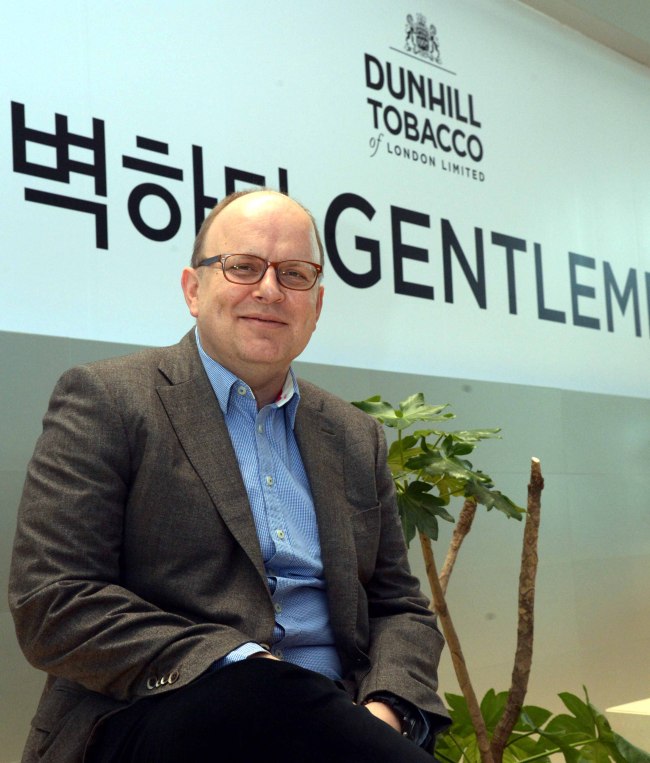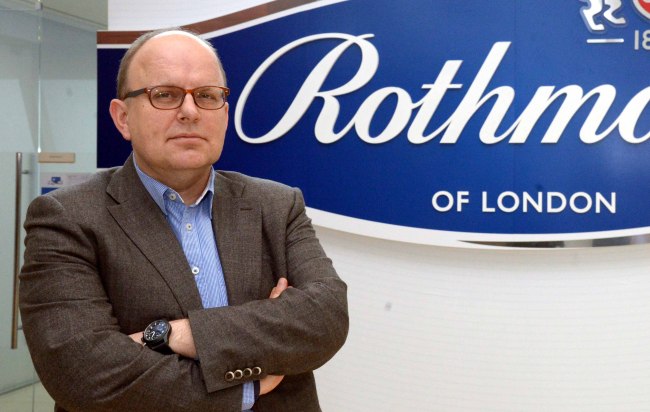The chief executive of British American Tobacco Korea has some pretty firm beliefs on what should and should not be done.
And one of the things that he believes should never be done is working on a weekend.
“From Monday to Friday, I have an agreement with my wife that I can dedicate any amount of time to my work, as long as I’m there for breakfast and see the children,” said Erik Stoel in an interview with The Korea Herald on Wednesday.
“When I’m in the office, I’m focused on what I need to do at work. As soon as I open the door to my house, I switch off everything from work and I’m there for the family,” he said at the BAT Korea head office in southern Seoul.
Stoel may be an ordinary father on the weekends -- helping his daughter and son with their homework or taking them out for some sports at Namsan Park, near their home in Korea -- but during the week he is known for his intense work hours, even by Korean standards.
Stoel says that his working style in Korea has been influenced by the rigorous work ethics that corporate Korea is known for.
“I’ve never seen people working so hard as in Korea. I find it amazing,” he said. “I’m a hard worker by nature also, because I just like the things I’m doing. But when I came to Korea, what instantly amazed me was that I had to move people out of the office because they were working too hard.”
“There’s such a power that you can get things done in Korea, that you can’t do in other markets. It’s a sheer resilience, drive, hunger. And for a company, that’s beautiful.”
Stoel said that this drive was part of what made BAT Korea the second largest exporter of talent within the group, with Korean managers being sent out to key roles across the Asian region, including the regional human resources manager for Asia.
 |
(Chung Hee-cho/The Korea Herald) |
According to Stoel, the Korean market and its consumers are just as dynamic as his employees. He described the Korean market, where he has been working for the past 3 1/2 years -- the last four months as chief executive -- as “the most challenging” of the nine markets he has been involved with over the past two decades.
“(Korea) is one of the top-opportunity markets in the world, not only for BAT but for any tobacco company,” he said, citing both the size of the tobacco market here and the relative affordability of cigarettes.
“Out of all the markets I’ve been in, this is probably the most competitive. In most markets, you fight for 1 percent (market share). Here, you go for the 0.1-percent level.”
He also noted that the Korean consumer was willing to try new things and was always expecting innovation, which separated it from other markets.
“In Malaysia, one of my former markets, every two months a competitor might do something big,” Stoel said. “Here, having five or six big competitive activities a month is quite normal.”
Stoel also said that the competition might not be completely fair to begin with.
“Until recently there was an absence of a level playing field in Korea,” he said. “There has just been a Fair Trade Commission ruling saying that certain channels whether it’s military, highways or certain key accounts would have to open up because historically as an international company you couldn’t get in. It does make the market perspective for Korea challenging. Very interesting, but challenging.”
Still, he said that the Asian market was where he wanted to remain precisely because of its fast-paced nature.
“Every time we talk about my future, I say I’d like to stay in this part of the world,” he said, adding that he liked especially working in markets where there was a “big challenge” or a clear task to bring a big turnaround.
His love of big, dynamic markets is not surprising, as his motivation for joining BAT had a lot to do with experiencing markets all over the world.
Stoel was born and raised in a small city in the Netherlands, where his parents ran a chocolate manufacturing company that supplied European supermarkets. It was there that he cut his teeth in basic business management, and where he first tested out his sales marketing talents as a teenager and young adult.
Two years after his college graduation, Stoel was intent on seeing the world. The family sold the company, giving up their initial plan to have the younger Stoel take over.
That was when he came across a recruiting advertisement for BAT in the morning paper. It was the first one that met his personal requirement for an employer: a multinational company that would give him opportunities to work abroad.
 |
(Chung Hee-cho/The Korea Herald) |
“It was the first job application letter I had ever written,” he recalled.
Over the next 20 years, his job at BAT would take him to nine different countries; first to Ukraine, where he met his wife, then to areas like London, where his daughter was born, and Dubai, where he had his son.
Now, he’s landed in Korea, where he is expected to stay the longest in his entire career. He says that his goals for 2016 are twofold: to strengthen BAT’s Dunhill and Rothmans brands, and to work with the government to work out a steadier system for raising excise taxes on cigarettes.
When asked about potential non-cigarette tobacco products such as vapor-based or tobacco heating products that BAT is already testing in other markets, he only said that the company was “very close” to developing the right product for Korean consumer needs.
“One thing I know in Korea,” Stoel said, “is that if I launch a new product it better be damn, damn good.”
(
hjwon@heraldcorp.com)









